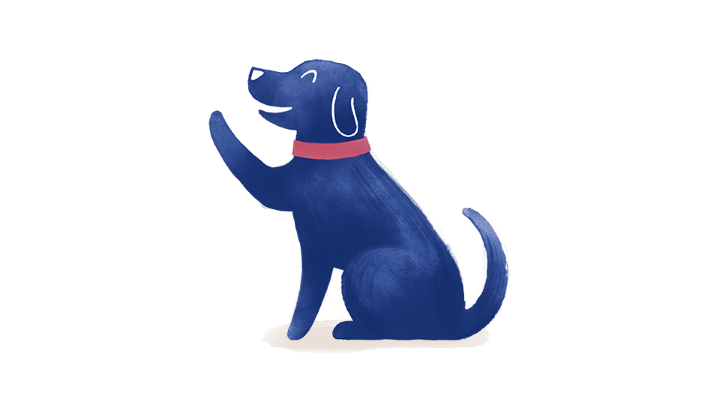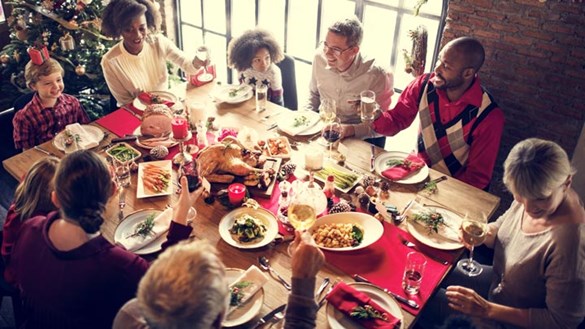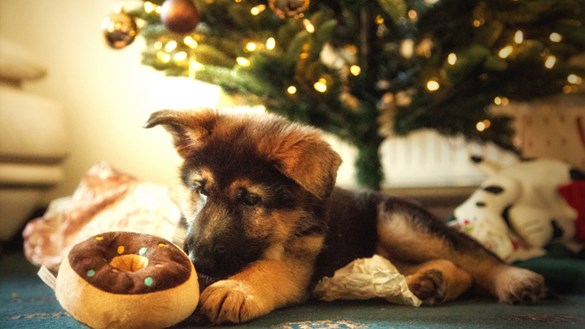Christmas Food Safety
Christmas is a great time to be with friends, family and pets. As you’re enjoying yourself, don’t forget that some traditional Christmas foods can cause issues for your pet.
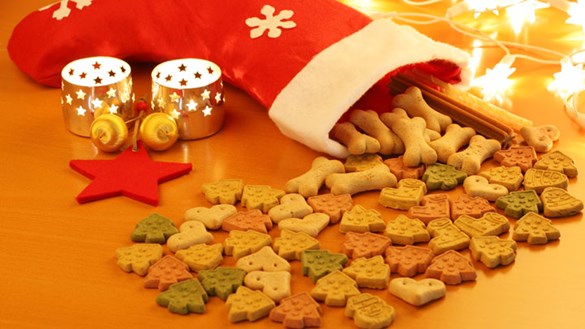
Young puppies and kittens can be especially curious about all the new things they see and smell. Read on to find out which foods should be kept out of paws reach and which foods are safe to share.
What food should I avoid giving my pet at Christmas?
Food plays a big role in Christmas celebrations, but did you know that many of the nation’s favourite Christmas treats are toxic to pets? With all the excitement going on, many pets may even use the opportunity to help themselves to some tasty treats – make sure you keep kitchen cupboards closed, use a sturdy food waste bin that can’t be tipped over, clear away leftover dinner plates and always clean up any spillages and crumbs.
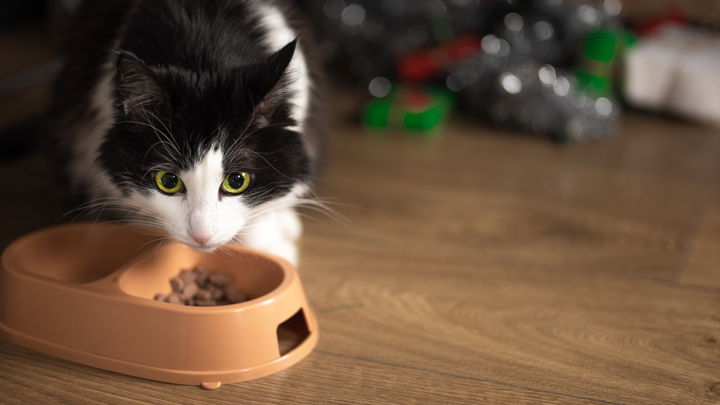
Below are some festive favourites that you should avoid sharing with your pet:
- Pigs in blankets and gravy are fatty and salty and, if eaten in large quantities, can cause digestive issues in pets including pancreatitis. In this condition the pancreas becomes inflamed, resulting in vomiting, loss of appetite and abdominal pain.
- Grapes and highly toxic and subsequently so are raisins and sultanas. If eaten they can cause kidney issues, so keep mince pies, Christmas pudding and fruit cake well out of paw’s reach.
- Onions, shallots, garlic, leeks and chives are all members of the allium family and can cause vomiting, diarrhoea, and even anaemia in pets. Avoid feeding pets things that include these ingredients like stuffing and onion gravy.
- Leftover turkey bones. While it may be tempting to give your dog leftover turkey bones, they have a brittle nature and so there is a risk of them splintering making them dangerous for your pet’s digestive system.
- Nuts, including macadamia nuts and walnuts, can cause lethargy (tiredness), high temperature, tremors, and stomach upsets. Please keep them out of the way of inquisitive pets.
- Nutmeg is often used to add spice to festive treats but it’s highly poisonous to pets and can result in tremors and seizures.
- Chocolate is one of the most well-known toxic treats, and it’s usually in abundance at Christmas. Chocolate contains the toxic compound theobromine and eating small amounts of it can be fatal, so it’s essential you keep it wrapped up and out of the way. Ideally avoid hanging chocolate on your tree, but if you must hang it higher up. The 'darker' the chocolate the more problematic it is so be especially careful when baking.
- Alcohol is bad news for pets. It affects them in a similar way to humans, causing drowsiness and lack of coordination, but it can also dramatically lower their body temperature and blood sugar levels, leading to seizures and comas.
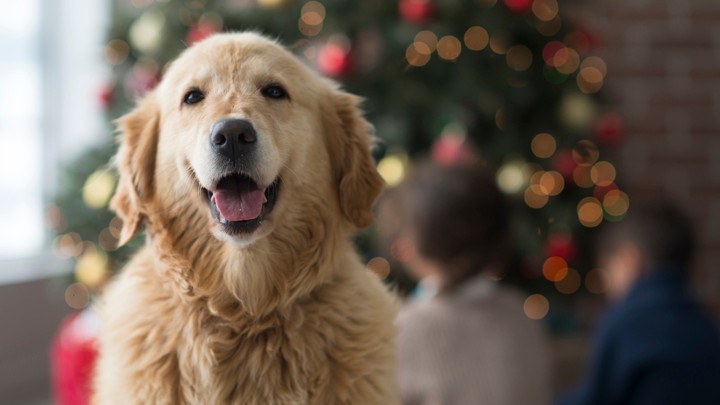
If your pet does eat any of these festive toxins, call your local vet immediately for advice. Knowing what they have eaten and how much has been consumed will help them give you the best advice. All Medivet 24-hour emergency centres are open throughout the Christmas holidays.
It may be tempting to to give your dog a little treat under the Christmas table. However, be careful, as you may start a new tradition and behaviour which may be difficult to break once the festivities are over.
Ensure that anyone visiting you is aware that they shouldn’t feed the dog chocolate or any of the other things mentioned and ensure that they are left out of temptations way.
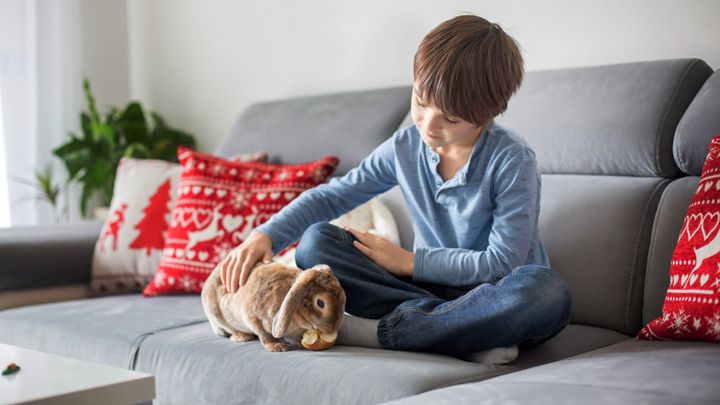
Can dogs and cats eat turkey?
Turkey is the ultimate food staple at Christmas. As dogs are omnivores and cats are carnivores, meat is very important for their diet. Turkey is a healthy lean meat that is found in many pet foods. You’ll earn big brownie points from your cat or dog for a piece of plain, unseasoned slice of turkey which is free of bone and skin. Ensure you give this festive treat in small amounts to avoid an upset stomach or other issues.
Can I give mince pies to my dog?
Mince pies contain food which is very poisonous to dogs such as raisins, grapes, sultanas, and currants – which can lead to kidney failure.
Pet-friendly Christmas snacks
Don’t worry, there are a few parts of your Christmas dinner you can share with your pet (not under the table though). Always give these tasty titbits in moderation and reduce the amount of pet food you give them that day to maintain a healthy weight.
Dogs and cats can have:
- A slice of plain, cooked, white turkey meat
- A small piece of plain, cooked, boneless salmon
- Raw carrots
- Plain brussels sprouts
- Plain boiled parsnips
Rabbits can have:
- Raw carrots
- Raw brussels sprouts
- Raw parsnips
- Raw peas
- Fresh rosemary, thyme and sage
Find out more about dog nutrition, cat nutrition or rabbit nutrition.
Pet Safe Food FAQs
This is a tricky one as many dogs are highly motivated by food. It goes without saying that you should always avoid feeding your dog from your plate and/or under the table. Ensure that Christmas guests, especially young children are reminded of this rule – it only takes a couple of times for your dog to think that they’ll get food if they hang around while you’re eating and give you the ‘puppy-dog’ eyes. If your dog has a habit of doing this, there are a few things that you can do to try and stop it, you and the rest of your family will need to consistent. 1. Ignore them – don’t look at them or talk to them, even to tell them to stop begging – if they never get your attention or food, they should hopefully give up. 2. Distraction: train your dog to settle on command and get them to chill out in their bed or favourite spot. If they have a much-loved toy, save it for when you’re eating. 3. Feed your dog in another room at the same time. If you have a puppy, it’s important to start off on the right food and tempting as it may be to give them a treat, you’ll regret it in the long run.
Try to identify what your dog may have eaten (and how much of it) to give you an indication of how serious it may be. Our poisons checker is a good place to start. If your dog is acting differently or isn’t acting normally, we would recommend looking at our poisons checker unless the or showing severe symptoms (vomiting or diarrhoea) symptoms are severe, in which case we would recommend taking your dog to your nearest practice as soon as you cancontacting your vet immediately.
For more advice on pet safe food, speak to your Medivet practice.

Medivet Healthcare Plan
On average our clients save up to £280 each year with the Medivet Healthcare Plan.
Learn more


